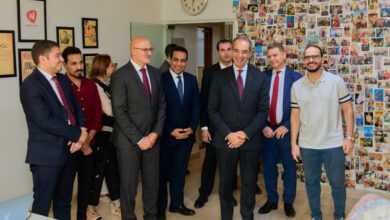“Sharm El Sheikh Agreement” Boosts Global Outsourcing Companies’ Confidence in Egypt

A number of experts and officials in the Information Technology sector agreed that Egypt’s sponsorship of the peace agreement between the Palestinian and Israeli sides in Sharm El Sheikh is likely to contribute to the stability of security and political conditions in the Middle East.
This stability will incentivize global companies to expand their operational presence and inject new investments into the local market.
They predicted that Egypt could transform into a leading regional hub for providing outsourcing services in several areas, including technical support and financial services, provided that commitment to the truce agreement between the two warring parties continues. This would strengthen investor confidence and ensure the sustainability of operations while reducing operational risks.
Dweidar: Stability Reduces Insurance Costs… International Promotional Campaigns to European and American Markets are Needed
Maggie Dweidar, CEO of “Enable” Outsourcing Services, stated that the stability of security conditions in the region following the signing of the ceasefire agreement is a crucial factor in boosting investor confidence, especially in sectors that rely on continuity and reliability, such as outsourcing and call centers.
She explained that investors seek a politically and security-stable environment to guarantee operational sustainability and minimize operational risks.
Maggie confirmed that the stability of the situation would reduce insurance costs and risks, in addition to enhancing Egypt’s image as a safe and stable location in a region suffering from turmoil.
It would also encourage global companies to expand their operations instead of being content with small or pilot centers.
She added that a stable regional climate would give Egypt a competitive advantage in the outsourcing industry, especially given the regional competition with other countries like Morocco, Tunisia, Jordan, and even Turkey.
This is due to Egypt’s several competitive advantages, including a massive pool of educated, multi-lingual youth, competitive operating costs compared to Eastern European and Gulf countries, and, finally, a relatively developed digital infrastructure supported by the government and the Information Technology Industry Development Agency (ITIDA).
She continued: If stability persists, Egypt can transform into a leading regional hub for providing outsourcing services, particularly in the fields of technical support, customer service, and data analysis.
Maggie called on the government and ITIDA to capitalize on the regional de-escalation by launching international promotional campaigns targeting European and American markets to highlight Egypt’s stability and developed digital infrastructure, as well as the tax and legislative incentives offered to attract global companies, especially in technology zones like Maadi and Borg El Arab.
She also emphasized the necessity of expanding training and qualification programs in cooperation with global companies to provide ready-to-work cadres, in addition to facilitating establishment and expansion procedures for companies currently operating in the local market, including accelerating license finalization and providing logistical support.
She further suggested that security stability will reflect positively on the movement of human capital within the industry.
The return of Egyptian competencies from abroad becomes more likely if they feel secure and stable, especially with the presence of competitive job opportunities.
Additionally, it will attract new skills from other sectors within Egypt, such as fresh graduates or professionals in related fields (like marketing or sales), and finally, reduce employee turnover rates due to an improved work environment and employee confidence in the sector’s sustainability.
Mahfouz: The Opportunity is Ripe to Bolster the Outsourcing and Software Industries
Eng. Amr Mahfouz, CEO of Delta Electronics Systems and former CEO of ITIDA, affirmed that the recent ceasefire agreement in the region will create a state of positive anticipation among global investors towards the Egyptian market, viewing it as one of the most stable and capital-attractive countries in the coming phase.
Mahfouz explained that while Egypt was not directly affected by the ongoing regional events, the continued de-escalation and the resilience of the agreement, alongside the start of executive steps for Gaza’s reconstruction, will boost Egypt’s economic standing and create activity in multiple sectors.
Prominently among these is Communications and Information Technology, which is closely linked to the outsourcing services and software export industries.
He pointed out to the “Ta3heed” that the significant political and media momentum witnessed in Cairo in recent days following the agreement’s signing and the visit of several world leaders represents a golden opportunity that must be seized to market Egypt as an attractive investment destination regionally and globally.
He stressed that the government is urged to move swiftly to promote available opportunities in various fields, particularly IT and call centers.
Mahfouz emphasized the necessity for Egypt to move beyond merely investing in human capacity building to the production of software and integrated technical solutions, thereby contributing to maximizing returns and increasing digital exports.
He also called for preparing a clear package of strategic projects to attract foreign investments, especially in the data center sector, which possesses strong growth potential to transform into a regional hub for cloud computing and outsourcing services in the region.







